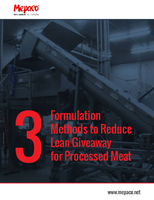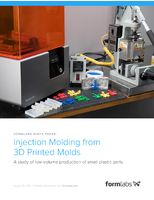Thin-Sheet Float Glass measures 0.1 mm thick.
Share:
Press Release Summary:
Alkali-free ultra-thin sheet glass, manufactured using the float process, measures only 0.1 mm thick and is composed of silicon dioxide, boron oxide, and aluminum oxide and is free of alkaline elements such as sodium and potassium. Used as substrate for TFT-LCD and OLED, it is suitable for use with displays, lighting, touchscreens, and high-tech applications such as medical devices.
Original Press Release:
AGC Develops World's Thinnest Sheet Float Glass at Just 0.1 mm
TOKYO - AGC announced today it has developed ultra-thin sheet glass manufactured using the float process, measuring just 0.1 mm, roughly the thinness of a sheet of paper. Made from alkali-free glass, which is used as a glass substrate for TFT-LCDs, AGC's unprecedentedly thin sheet float glass will be used in next-generation displays, lighting, touchscreens and high-tech applications such as medical devices.
Recent shifts towards increasingly thin and energy saving displays and OLED lighting are now being taken to the next level with the development of next-generation flexible displays and OLED lighting. This is creating more demand for glass materials, including glass substrates and cover glass for touchscreen panels and glass substrates for displays. Thin sheet glass is expected to be used in such products due to its flexible shaping and light weight, as well as basic characteristics of glass such as transparency, electrical insulation and resistance to heat, chemicals and gases.
AGC has extensive experience with the production of thin sheet glass. Over five years ago, the company began mass producing and shipping 0.4 mm, alkali-free glass as a TFT glass substrate. Later, the thickness was reduced to 0.3 mm. In April of this year, AGC began selling the world's thinnest, 0.28mm, soda-lime glass substrate for touchscreens.
AGC's ultra-thin sheet glass will be exhibited at Display Week 2011, which will be held by the Society for Information Display (SID) in Los Angeles, California from May 17.
AGC is contributing to more environmentally friendly and comfortable lifestyles by developing new technologies and expanded applications for glass under its Grow Beyond strategy of building new foundations for growth through innovative solutions.
Notes:
- The float process is a glass-manufacturing method in which glass is floated over molten metal for the efficient production of highly uniform glass.
- Alkali-free glass, composed mainly of silicon dioxide, boron oxide and aluminum oxide, is free of alkaline elements such as sodium and potassium, and is used widely as substrates for TFT-LCD and OLED.
- Soda-lime glass, composed mainly of silicon dioxide, sodium oxide and calcium oxide, is used widely in construction, automotives and many types of electronic devices.
About the AGC Group
The AGC Group, with Tokyo-based Asahi Glass Co., Ltd. at its core, is a world-leading supplier of flat, automotive and display glass, chemicals and other high-tech materials and components. Drawing on more than a century of technical innovation, the AGC Group has developed world-class expertise in fields including glass, fluorine chemistry and ceramics technologies. The group employs some 50,000 people worldwide and generates annual sales of more than 15 billion USD through business in about 30 countries. For more information, please visit http://www.agc-group.com/en.
SOURCE
AGC Group
Web Site: http://www.agc-group.com/en




